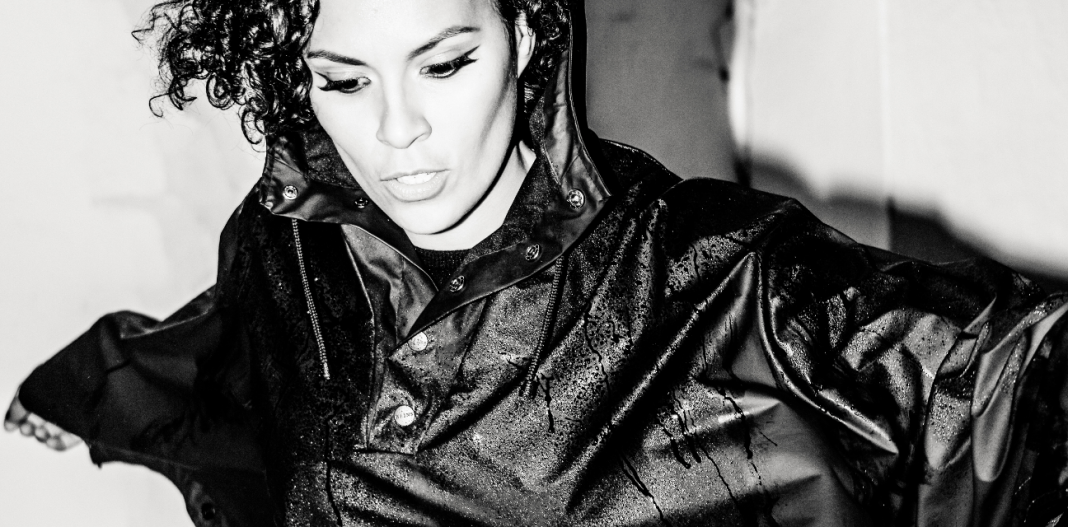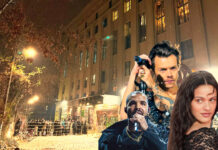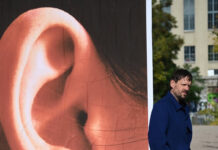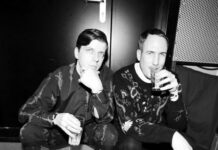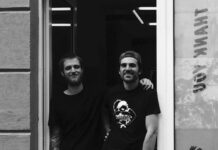Photo: Stephan Redel (Virginia)
When Virginia’s Fierce For The Night was released in 2016, critics started argueing about whether or not that meant a step forward for her label Ostgut Ton or if it rather came full circle after vocal-heavy house releases by the likes of Prosumer a few years earlier. What was probably even more remarkable about the record however was that Virginia Högl brought in three producers – long-time collaborator Steffi and her respective partner-in-crime Dexter as well as Panorama Bar colleague Martyn – for the writing sessions. The result was an LP as diverse as everything Högl’s been doing since cutting her teeth in the Munich underground scene in the early noughties to touring as a background singer of Nena or Clueso, providing vocals for Butch and Steve Bug and taking up a residency at Panorama Bar. For Virginia, energy and harmony are not mutually exclusive but in fact complementary, whether in the studio or in the DJ booth. It is no surprise then that her contribution to our Groove podcast takes a soulful approach to one of her greatest passions, electro music.
You’ve received piano and singing lessons in your childhood, moved on to RHCP and Nirvana before discovering Sade and epiphany of sorts during a DJ set when Underworld’s „Born Slippy“ was put on. What drew you to electronic music?
The music of Sade and Tracy Chapman has been inspiring me for so many years, even before the whole Grunge movement in the beginning of the 90s. Back then electronic music was so new and fresh – soundscapes I had never heard before. Experiencing this kind of music on big sound systems was amazing. I felt it in every inch of my body. The energy that resonated from artist like Underworld or The Prodigy was impressive. I guess „Born Slippy“ speaks for it self. Timeless music and one of the best electronic music songs ever produced. I felt I needed that kind of music and started collecting records in 1994.
Your album Fierce For The Night was heavily song-orientated, with your vocals sometimes dominating the tracks. How did you approach writing the lyrics for what was essentially a team effort between you, Steffi, Dexter and Martyn?
Fierce For The Night was intended to be a pop album, therefore we worked with classic pop song structures. The focus is on the vocals. I approached each song differently. Sometimes I sang guide vocals and I did like the sound of a word I just used. I took this specific word and wrote a story around it. For other songs I tried to catch the emotions the instrumental released for me and wrote down that story. Most of my lyrics are autobiographic. Maybe a rough phase I went through in my life, just things I experienced myself. Writing about it helps me to get it out of my system. For songs like the more uplifting and dancefloor-oriented “1977”, i wanted to pick up topics that are always present in house music – love, passion, extasy, sexual tension, fun, etc.
Despite disco music having been played more frequently in clubs these last years, contemporary house music – aside from the occasional sample – rarely makes use of vocals. How would you explain the disregard, if not resentment within the scene towards song structures and vocal-heavy tracks?
Generally, I get the feeling that people actually want more vocals these days. Seeking for more soulful music. I am not talking about cheesy music or a vocalist who won’t stop singing for the whole song. I am talking about catchy vocal lines and great arrangements – a good vocal song. Fortunately, I don’t feel any resentment towards the vocal tracks I play or my live vocals during my DJ sets. Maybe „the scene“ just does’t like bad songs?!
Singing also plays a crucial role in your DJ sets. Do you have any way of preparing for those sets and what’s important to you while you’re at it?
When I go through my records at home I eventually find a track that has a lot of space for vocals. Meaning the instrumental has a nice melody I can follow. A breakdown in the song that leaves space for me to improvise or interact with the audience. The track even can have vocals already, and I would sing a harmony voice on top of it. By the time I am playing my set at the club I probably have forgotten about the idea I had quickly recorded on my phone at home so I just improvise. Other times the idea for my vocal line is so strong that it keeps coming back to me while I play out the record. I like to get in touch with my audience and that is a great way to speak, to interact. I like seeing surprised faces of people who see me perform for the first time. Also I get connected with the music I play through adding my voice as an instrument.
After completing Fierce For The Night, you’ve moved into a new studio space in Berlin. What does a recording studio need for you to be creative in there?
The vibe and the energy of the room is important for me in order to be creative. I like working during the day and ideally the room has a view, a little bit of sunlight, is warm, dry and clean. I can be a bit of a maniac when it comes to cleaning.
Your contribution to our Groove podcast highlights your passion for all things electro. What was your idea behind the mix and how did you record it?
The mix was recorded at home in a very classic way: two Technics 1210 and a Rane MP2015 DJ Mixer. My love for electro is very deep indeed. I take this Groove mix as another great possibility for me to put together a mix of records that I really like but won’t be able to play them as much as I would like in my more house-oriented DJ sets. The mix includes some older tunes like Kit Builders “Sympathy” from 1999, some new school electro from Late Night Approach on Klakson and a great track by Alonzo, who formerly was a part of Ultradyne, and other great tracks.
Last but not least: Where can we see you behind the decks and/or performing live in the near future, and what are your plans as a producer and singer?
The first weekend of march I will be playing at The Block in Tel Aviv and Saturday at Panorama Bar. Mid-March I will be touring in Asia for shows in Seoul, Shanghai, Beijing, Singapore and Hanoi. After that I have planned studio time until mid of May. I am working on a couple of collaborations this year, already started writing new music with Steffi. Plans for a second Virginia solo album are also already in the making.
Stream: Virginia – Groove Podcast 148
01. Kosh – Electronic Setups [Casa Voyage]
02. Hardfloor – Skill Shot (Versalife Version 2) [Hardfloor]
03. The Exaltics – i.m.o.E.H. (Gosub Turbidity Mix) [SolarOneMusic]
04. OCB – Aquaquest [Casa Voyager]
05. Stojche – Radical Measure [DMK]
06. Late Night Approach – Luvequest [Klakson]
07. Entro Senestre – The Screen [Dekmantel]
08. Robyrt Hecht – Apperceptive Move [Possblthings Records]
09. Alter Ego – Lycra (Alter Ego Dub) [Klang Elektronik]
10. Black Electric – Colors [Puzzelbox Records]
11. Kit Builders – Sympathy [Electrocord]
12. Alonzo – I’m A [W.T. Records]
